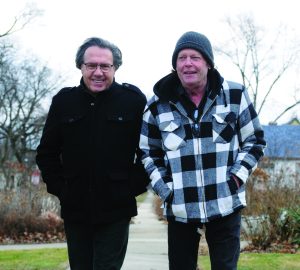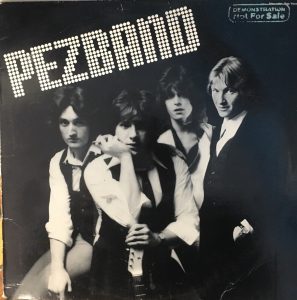’70s rockers from Pezband still rocking in their 70s
By Bill Dwyer for Chronicle Media — September 19, 2023
Mimi Betinis (left) and Mike Gorman founded power pop legend Pezband. (Photo by Jim Summaria)
“It’s a long way to the top, if you wanna rock ’n’ roll,” AC/DC sang.
No one knows that better than Oak Park natives Mimi Betinis and Mike Gorman. Betinis and Gorman founded power pop legend Pezband, and Gorman played bass both in Pezband and another legendary Chicago band, Off Broadway.
They first picked up guitars in the exhilarating wake of the Beatles and the British Invasion, when songs drifted out of basements and garages on every other block. In Oak Park, it was bands like The Time, Society’s Reaction, The Rebellion, The SARFs, The Rising Suns, The Cellar Dwellers, and others.
Gorman started playing bass as a 12-year-old, first in The Rebellion, later in Society’s Reaction. Betinis was lead guitarist for The Time. Most of the guys- — they were all males — eventually left music behind and became businessmen, ministers, cops and other occupations.
But Betinis, Gorman and a few others never stopped making music. They’d seen their future.
“We were just out of high school and we got a jam band together,” Betinis recalled. “Myself and John Pazdan, Barry Holden. And we called it the Black Pudding, an English type thing. And that was like a “summer band. We were just guys who played guitar. That’s all it was, really. That was the thing to do, to jam. Smoke pot and jam.”
That summer, “the thing to do” began growing into something much greater.
“We were hanging out in this one park (Field) by Mann School,” Gorman recalled. “Mimi said why don’t you come over and I can show you what we’ve been working on … . He was like here, take these home and listen to them. See if you can learn that.”

Pezband’s first album cover.
It was Fleetwood Mac’s “Tell Me,” the song Pezband opened their early shows with. Drummer Mick Rain soon joined the band, and Pez, soon to be Pezband, started playing wherever there was a stage. “We played the old coffee shop (next to Oak Park and River Forest High School) in the ’60s, in the basement of the rambling (and now demolished) old vicar’s house,” Betinis said. “We played the pizza places, the Redwood Inn on North Avenue. We played everywhere.”
“Back then, there were so many venues,” Gorman said. “You could play six nights a week if you wanted. It’s all we did. The suburban bars, we used to be able to pack those places. And we’d ask for $7 (minimum wage: $2.10), and people were like, no problem.”
“It was in the back of everybody’s head, this is something we could do. And we’ll just see what happens,” he said.
Betinis didn’t go away to college, but he went to art school in Chicago, and Pezband’s early success left him with a choice to make. In a press release at the time, he acknowledged how his single path had diverged into two, a classic Robert Frost moment.
“I loved Max Ernst and Dali, but I had this other idol, another artist — Jeff Beck,” Betinis wrote. “Singing all night and having to get up and get to classes the next morning was an impossible situation. There couldn’t be a compromise. Pezband is what I wanted.”
And that, as Frost wrote, “made all the difference.” Playing constantly, Pezband developed from earnest amateurs into polished professionals.
Betinis wanted to drop singing duties and just play guitar. Enter Cliff Johnson, who he knew from high school as lead singer for The Rising Suns. Johnson would drop by and talk music when he was home on break from college.
“And we were like, why don’t we get this guy to sing,” Betinis said. “Because I wanted to be the guitar player, I wanted to be the Jeff Beck of the group.”
The group cut a studio demo, now titled United Technique 1972: The First Studio Demos with Gorman, Rains, John Pazdan and Cliff Johnson, produced by John Pavletic. The 23-minute album, filled with sterling pop music, features the first version of the Betinis-penned “Drop Me A Line,” which would appear on Off Broadway’s debut album “On!”
Guitarist Tommy Gawenda eventually replaced Pazdan, and Pezband was soon at the forefront of the Chicago music scene. By mid-1974 they were playing to 2,000 fans a night at venues from New Jersey to California. Then suddenly, with a record deal imminent and the band headed to Los Angeles to play a showcase gig at Whiskey a Go-Go, Johnson up and quit, devastating his bandmates.
“Cliff’s a hard act to follow. He was so wild and entertaining,” Betinis said. “But when he left us, it was like, what are we gonna do. (And someone said) well, you have a similar voice, why don’t you go and sing?”
“I wasn’t very confident. It was hard,” said Betinis, who acknowledged being “very shy.” Pezband eventually got back on track, and by early 1977, had moved to New Jersey.
“Everything happened in ’77,” Betinis recalled. “We did the record, we did the ABC Record Convention … . We got on radio stations. We got on TV stations out there. We were on Good Morning America with Jane Pauley.”
The rave up “Let’s Dance” featured a saxophone solo by then-relatively unknown session player Clarence Clemons. In 1978, Record World crowned Pezband “Most Promising New Act of the Year,” and Billboard and Trouser Press were singing their praises.
“Those two years, we really felt we were on our way,” Betinis said. “We were just going everywhere. We’re on our way up.”
From “Gas Grill” on the eponymous Pezband, through “Stop! Wait a Minute,” “Baby It’s Cold Outside,” and a dozen other numbers, Pezband delivered one pulsating riff and hook laden pop gem after another. A video of their 1979 gig at the Big Kumquat in Arlington Heights features the band’s cover of the Beatles’ “Slow Down,” and it’s easy to imagine it echoing off the bricks in Liverpool’s Cellar Club.
But Pezband was like a firework that soared higher and higher, but didn’t quite light up the night sky. In 2006, music critic Larry Lange would call them “The Best Band You Never Heard Of.”
“We’ve heard this our whole lives,” Betinis said. “‘You guys were so good. You were great live.’ Yeah, we were. We were very good. We knew we were good. Why it didn’t go as far as it should have gone, that’s anybody’s guess.”
“Every city’s got guys who were, ‘Oh, can’t miss. Don’t know what happened to them,’” Gorman said with a slight shrug. “Every city’s got a band like that.”
But it clearly haunted them. 1979’s “Didn’t We,” with its lilting guitar chords and yearning vocals by Betinis, could be mistaken for a goodbye to a lover. And in a way, it is.
“Cliff came up with the idea, and I wrote most of the music,” said Betinis. “It was sad. It was kind of a farewell but both of us were saying the same thing … . We’ve tried so hard to do all this stuff, and we’re so influenced by the British Invasion … . If you listen to the song, it talks about Britain.”
“I called your heart my home, there I had lived so long. But now I’m giving my heart back to the states again, where it all began.” He said.
“Why’s it all wrong. Tried for so long. Didn’t we? Didn’t we?” Betinis sings.
“I can’t make my dream come true. I was a fool, but my love was true. But my love was true.”
“But you were still just a dream.”
Betinis and Gorman wish it had been different, but they cherish all the many experiences. “We were in that place at that time,” said Gorman. “And all that stuff, we put work into it, but we were very fortunate that we were there at that time and that place. It’s amazing.”
“We didn’t feel that way when we were in it,” Betinis said. “That’s just what we were doing at the time. But now, … we think, wow, we really made a mark, I guess.”
“When you talk about power pop, our name comes up,” Gorman said.
Though they walked away from Pezband, neither man put down his instrument. Betinis occupies himself in his home studio with recording new music and readying the new 22-song retrospective “The Best of Pezband,” with an expected release by year’s end.
Gorman plays with The Outfit, a group of veteran rockers that includes drummer Mark Nawara, guitarist Matt Nawara and singer/guitarist Andy Mitchell. They’ve opened for the likes of Ted Nugent and will play a live show in October in LaPorte, Indiana.
Great music is timeless, and the musical magic that captivated two schoolboys in the ’60s is still enthralling kids half a century later. Gorman recalled walking past “a group of grade-school girls” at a car show a few years ago.
“And the DJ starts playing the Beatles, Twist n Shout,” he recalled, “and a couple of the girls in this group went ‘The Beatles!’”
Betinis shook his head in agreement. “Every time I hear that opening, just that handful of notes, it sucks you right in,” said Betinis. “It’s kind of clunky and cloggy sounding, but it’s wonderful.”
With a smile he added, “The good stuff always stays. The good stuff sticks.”







